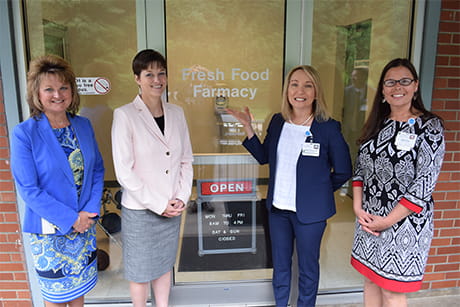Human Services Secretary kicks off Medicaid Innovation Tour at Fresh Food Farmacy
SHAMOKIN, Pa – Department of Human Services (DHS) Secretary Teresa Miller visited the Fresh Food Farmacy at the Geisinger Shamokin Area Community Hospital on Thursday, May 31, to learn about the outcomes of participating in the program, which provides nutritious food and counseling to individuals diagnosed with Type 2 diabetes and facing food insecurity.
The visit kicked off Secretary Miller's statewide Medicaid Innovation Tour highlighting innovative ways the state's managed care organizations are helping recipients address the social and environmental factors that impact their health and Medicaid healthcare spending, such as housing, food insecurity, and transportation.
"At DHS we are focused on the social determinants of health – those social and environmental factors that impact an individual's well-being," said Miller. "Nutritious food is the first critical step in overcoming serious illness and helping individuals gain self-sufficiency. Hunger has major impacts on health and development, which in turn affect an individual's ability to find and maintain employment."
Geisinger's Fresh Food Farmacy provides care to 150 patients, feeds 450 people and delivers 4,500 meals a week to the community. Patients who participate fully with the care team, attend educational classes and prepare the recommended foods have seen a 20 percent improvement in their blood sugar control in six months and sustained this improvement over 12 months. Many patients have also seen significant improvements in total and LDL cholesterol, blood pressure and body weight.
"In addition to the clinical outcomes demonstrated, early data analysis suggests that emergency room visits and hospital admissions are down for this group when compared with similar patients," said Allison Hess, associate vice president of health and wellness at Geisinger. "This leads us to believe that the program is improving the health and well-being of our patients while reducing the cost of care."
DHS is placing greater emphasis on social determinants of health, like housing, food insecurity and employment. Because the department's healthcare spending is driven by so much more than just the healthcare individuals receive, DHS is working closely with managed care organizations and encouraging them to find creative, innovative ways to help individuals address the social and environmental factors that impact their health.
“Programs like this benefit recipients, managed care organizations as well as the state budget - by improving access to care, health outcomes, and reducing costs,” said Miller.

From left to right, Leesa Allen, Department of Human Services (DHS) executive deputy secretary; Teresa Miller, DHS secretary; Andrea Feinberg, M.D., medical director of Geisinger’s Health and Wellness Program; and Allison Hess, associate vice president of Geisinger’s Health and Wellness.
